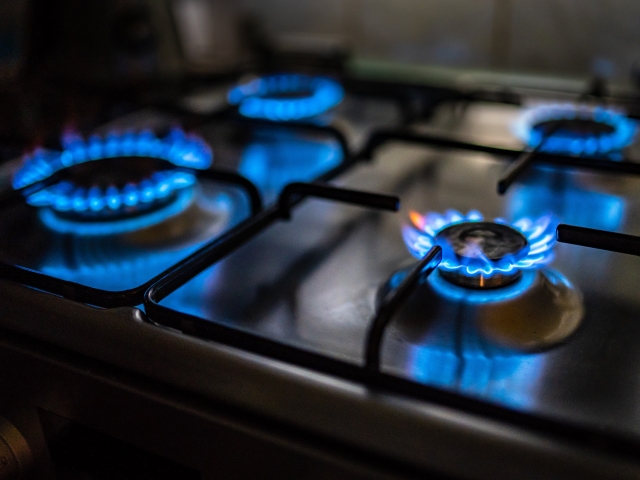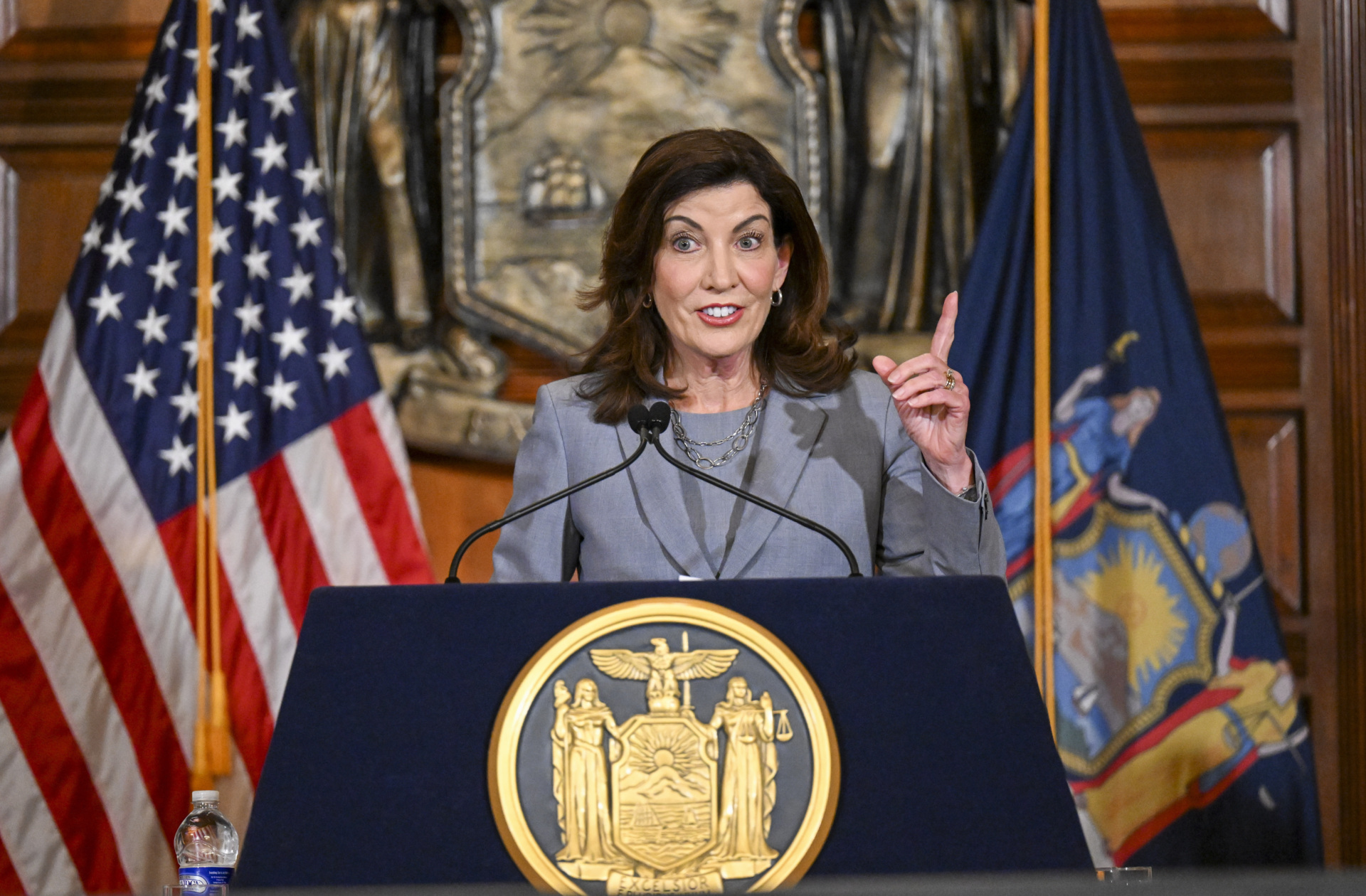
The Big Ban and the Trojan Horse
“A US federal agency is considering a ban on gas stoves.” That was the January 10 headline at CNN, so you know it’s well sourced to Democratic thinking. The piece quoted Richard Trumka Jr., appointed by President Joe Biden to be a commissioner at the Consumer Product Safety Commission (CPSC), saying that gas-powered stoves were a “hazard.”
“Any option is on the table. Products that can’t be made safe can be banned,” Trumka added. And if Democrats now say they are backing away from the idea, don’t be fooled. The ban-stoves mission is about climate change, and the greens who control the Democratic Party aren’t going to give up on that quest. Tactical retreat maybe, but strategic advance, always. Think Trojan Horse.

(Géza Bálint Ujvárosi/ EyeEm)
But first, let’s consider how the stove issue burned so hot. Established in 1972, CPSC is an independent regulatory agency. However, the chair is appointed by the president, and three of the four commissioners are Democrats (there’s a fifth slot, which is vacant).
Perhaps just as importantly, CPSC is headquartered in Bethesda, Maryland, right across the line from the District of Columbia. Bethesda is a Deep State Suburb, inside Montgomery County, where in the 2020 presidential election, the Biden-Harris ticket got 78.6 percent of the vote.
Yet interestingly, CPSC seems to be just as much green as blue. And Biden wants that as well. In 2021, the president issued Executive Order 14057, declaring:
It is therefore the policy of my Administration for the Federal Government to lead by example in order to achieve a carbon pollution-free electricity sector by 2035 and net-zero emissions economy-wide by no later than 2050.
That executive order sounded the trumpet, and the administration stood up a Sustainability Office to make sure everyone in the federal government heard the blare. Now it’s all aboard the climate-change express. So we can see: Trumka and CPSC didn’t just wake up and discover that gas stoves are bad. Instead, they woke up and realized that a stove-ban was their ticket to ride, alongside their fellow green Democrats. (Trumka, by the way, is Democratic royalty: His late father was the head of the AFL-CIO.)

President Joe Biden posthumously awards the Presidential Medal of Freedom to Richard Trumka as Richard Trumka Jr. accepts the award for his father during a ceremony in the East Room of the White House on July 7, 2022. (AP Photo/Susan Walsh)
Needless to say, CNN, too, is on board. Its original article on Trumka and CPSC cited various supposed dangers from gas stoves—nitrogen dioxide, carbon monoxide, fine particulate matter—while glossing over the reality that gas stoves have been in existence for 200 years. But then the CNN story edged over to the real purpose of the proposed gas-stove ban: fighting climate change. The article noted, approvingly, that cities such as San Francisco and New York have banned gas stoves in new buildings, “to reduce greenhouse emissions.”
Indeed, the story helpfully linked to another CNN story, headlined, “Gas stoves are a threat to health and have larger climate impact than previously known.” Did you catch the “climate impact”? Of course you did—and so did the greens. As in, climate is what this is all about.
It’s impossible to read news items about stoves and the stove-ban and not see at least some reference to climate change; for example, here, here, and here. In the meantime, another green liberal outlet, Bloomberg News, owned by you-know-who, ran an interview with Trumka which helped inspire the CNN story.
The Bloomberg article casually mentioned “parallel efforts by state and local policymakers” that are “targeting the use of natural gas in buildings more broadly, in a push to reduce climate-warming emissions . . . that exacerbate climate change.” We might linger over the telltale phrase, “parallel efforts.” Bespeaks concerted action, doesn’t? Yes, the greens are workin’ it. No wonder Bloomberg put its CPSC story in its “Green/Greener Living” section.
So now it’s all coming together for climate activists. In a December 14 webcast, Trumka volunteered, “We could get a regulation on the books before this time next year.” Meanwhile, friendly pressure has been coming from Democrats in Congress, pushing the agency to address the “climate impact” of stoves.
Yes, the path to a stove-ban has been green-greased, there will be obstacles. Big ones, starting with public opinion.
We’ve Been Down This Road Before—and Sanity Won
Some 35-40 percent of homes in the U.S. have gas stoves. As one wit had it, tweeting to the news of the potential ban, “My wife will become a single issue voter.” And how many restaurants, hospitals, schools, and other institutions have them? How much dislocation and expense will Americans tolerate in the name of “combating climate change,” even as China and the rest of the world busy themselves mining and burning record amounts of coal?
In their green zeal, CPSC bureaucrats might be biting off more than they can chew. It’s happened to over-eager regulators before. And in terms of overreach, the looming stove ban reminds this Baby Boomer of the Food and Drug Administration’s ban of saccharin, announced on March 9, 1977. Back then FDA trotted out the usual arguments about “the science,” and about how high doses of saccharin caused bladder cancer in mice, yada, yada, yada. I can remember watching late-night host Johnny Carson joking, “And if mice drink 800 glasses of milk a day . . . they will explode.”
Indeed, the backlash was so fierce that in November 1977, Congress, then overwhelmingly controlled by Democrats, overrode FDA’s saccharin decision. Forty-five years of saccharin consumption later, there’s been no cancer epidemic.

A group of diabetics from Atlanta arrive at Union Station after an overnight train ride on a train they dubbed the “saccharin special” so they could tell the Food & Drug Administration what they think of its proposed ban on saccharin on May 18, 1977. (Getty Images)
Fighting Back
Okay, so what might be done to stop FDA—oops, I mean CPSC—from trampling the American people today? Once again, just because they say that they’re backing away from banning stoves doesn’t mean they really are. Most likely, they will seek new angles that go under the radar, such as piecemeal regulation, combined with BlackRock/ESG-type corporate defunding. Still, normies are not without resources. Indeed, it’s possible to see an effective counter-strategy on three levels:
First, federal legislation. That’s what worked in 1977. Already, some Republicans are on the case: Sen. Ted Cruz tweeted an image of stove, adding the defiant words, “Come and take it.” How many in Congress will join Cruz? Undoubtedly a lot, but we’ll have to see if they’re enough. And what will the Biden White House will do? Yes, it’s been scurrying away, and yet the federal government is big and complicated–the Deep State is very deep–and so little green gremlins could be changing stove-policy if they think nobody’s looking.
https://t.co/wSHJ5KBmEZ pic.twitter.com/tt9Px5Qh9I
— Ted Cruz (@tedcruz) January 9, 2023
Second, federal litigation. Thanks to the personnel changes that Donald Trump and Senate Republicans made in the Supreme Court, a solid majority of the nine takes the Constitution seriously, as well as the letter of the law. And that could spell trouble for the stove-banners.
The powers of CPSC are extensive—but they might not be extensive enough for it to be a part of Biden’s green crusade. If we go back and look at Public Law 92-573, the Consumer Product Safety Act, we see that the legislative language gives the agency a broad mandate to regulate, even ban, just about anything that endangers a consumer. That wide power explains why, over the past half century, the agency has been able to order many thousands of recalls and make countless other interventions. (A half century in which CPSC thought gas stoves were okay.)
More precisely, its underlying statutory authority does not allow CPSC to play climate cop. So if it can be shown that CPSC is just pretending to worry about about consumer safety, when its real motivation is to join the Biden administration’s green climate crusade, the courts, and most of all the Supreme Court, will likely reject a stove ban.
Yet the green left is likely to keep coming, because climate change is everything to the true believers. A “major” study (they’re all major studies) published in Environmental Science & Technology last year tells the faithful that “annual methane emissions from all gas stoves in U.S. homes have a climate impact comparable to the annual carbon dioxide emissions of 500, 000 cars.” To a good green, what’s worse than an internal-combustion-engine car? And so maybe a gas stove is as bad! Just on January 10, New York’s Democratic governor, Kathy Hochul, announced that she would seek to ban new installations of gas appliances in the Empire State. Her rationale: “We’re taking these steps now because climate change remains the greatest threat to our planet.” So we see: The real motivation for banning gas-fired stoves is unapologetic green zealotry. (Never mind that many big-name Democrats have been proud to show off their gas stoves.)

New York Gov. Kathy Hochul (D) speaks to reporters at the state Capitol on July 1, 2022, in Albany, NY. (AP Photo/Hans Pennink)
Begun, the Stove Wars have. Happily, the newly conservative Supreme Court is on our side. It has been pushing back on reckless bureaucratic power. That pushback has been most evident in three big wins against overreaching regulatory agencies in the past two years: against the Centers for Disease Control (on the rent moratorium), the Occupational Safety and Health Administration (on workplace vaccine mandates) and most pertinently, against the Environmental Protection Agency (the high court ruled that EPA bureaucrats couldn’t make up new rules on carbon dioxide, beyond the statutory language of the Clean Air Act).
This is the key point: Our constitutional system allows federal regulatory agencies latitude on rule-making, including CPSC’a product-banning. But if it’s what the Supreme Court judges to be a “major question,” then no, the bureaucrats can’t just wing it; they need to get authorization from Congress. And it seems obvious that on stoves, CPSC is just winging it, thinking about green goals, as opposed to black-letter law.
To be sure, in a court case, it will be necessary to prove that CPSC has gone rogue. That is, litigants will have to show, to the satisfaction of judges, that CPSC-crats are guided by the extra-statutory goal of climate change, as opposed to consumer safety. And the making of that case against CPSC will require lots of digging. That is, discovery, subpoenas, Freedom of Information Act (FOIA) requests, under-oath testimony, and anything else that shines light on murky procedures and secret treaties. As we have seen, the evidence of green zealotry is all around, but it will have to be definitively found within CPSC’s decision-making process. Which is to say, the litigation will be lot of work; the hard work of freedom.
Third, state sovereignty. The last few years have seen an upsurge in the assertion of federalism, also known as states’ rights. During the Trump years, it was blue states up in arms, legally, against the federal government; the state of California filed 110 lawsuits against the Trump administration. Liberals loved that.
These days, of course, the opposition is coming from red states, rising against the Biden administration. Florida governor Ron DeSantis has been perhaps the most visible–and he’s been vocal, and visual, in opposition to the stove ban– but others, too, have been litigating, over everything from education to immigration to ESG to CDC.
Don’t tread on Florida, and don’t mess with gas stoves! pic.twitter.com/FNETzpuANe
— Ron DeSantis (@GovRonDeSantis) January 12, 2023
So what will these states do if CPSC does, in fact, ban gas stoves? Or maybe it just bans new ones? Or maybe it seeks to mandate some major modification. Beyond suing, might some red-state governor, or other official, declare that CPSC has gone too far, and is unduly endangering the safety and well-being of its residents in this winter—or the next winter? And announce an emergency solution, defying CPSC? If so, the state would be writing a new chapter in the long struggle to limit the power of the federal administrative state.
Evidently, CPSC will back off on a formal ban. In the meantime, the agency’s MSM allies seek to obscure the original issue in clouds of disdain and mockery; on January 13, The New Republic snapped that it was “tiresome” that “right-wing gasbags” could be worried about a non-issue such as stoves. Yet under cover, CPSC regulatory could start nibbling away at stove rights. That’s certainly a familiar pattern of stealth regulation: when the cat’s away, the regulatory mice will play, unspooling their red tape.
After all, having marinated in Naderite green liberalism for so long, CPSC is a strange agency. On January 1 it tweeted, “Deep in your heart you are a pigeon on a journey.” Now what does that mean? Is it some sort of inside joke? Some sort of coded signal? Or just random your-tax-dollars-at-play?
Soar in 2023 pic.twitter.com/uq8IlQOjNt
— US Consumer Product Safety Commission (@USCPSC) January 1, 2023
Equally strangely, CPSC’s Trumka, under fire even from some Democrats, suggests that his comments about banning stoves have all been a big misunderstanding. A CPSC ban, or other “regulation,” he now says, would only apply to new equipment. It’s nice to hear that CPSC won’t be coming for your familiar stove (the supply-chain for replacement parts could be another matter) but of course, if there is any actual danger from a gas stove, it’s the older models. So in saying that CPSC will only be targeting new stoves, Trumka is, in effect confirming that the ban is about climate, not safety. And such banning, of course, would be completely beyond CPSC’s legal writ.
In addition, we need to remember that Trumka & Co. could change their mind yet again, were they ever to sense that they could get away with it. Moreover, whatever he and CPSC do, there’re raft of greens in high places elsewhere in the government, eager to pull levers of power to accomplish the stove ban through some other mechanism, such as a credit squeeze. Because after all, in their view, there’s a climate to be saved. And if ordinary Americans are in the way? Well, the greens know what to do.
So most likely, we’re headed towards a hot fight over stoves. In the meantime, Republicans should stay cool, even as they ready themselves for a heated rumble.







